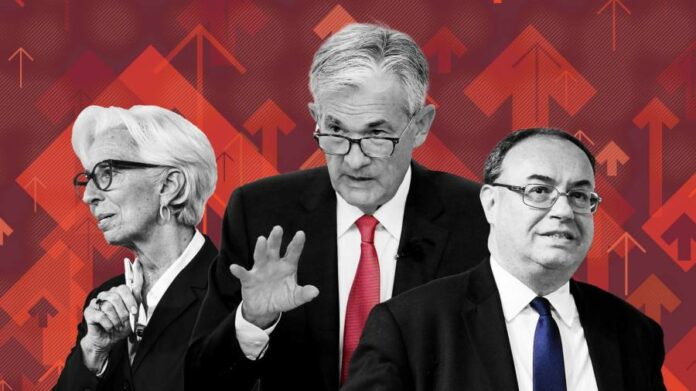Former central bankers are divided on whether the Federal Reserve and Bank of England should press on with interest rate rises — or pause to assess how far banking turmoil will curb lending and choke demand.
Last week, the European Central Bank went ahead with a planned half a percentage point rise, insisting there was “no trade-off” between fighting inflation and ensuring financial stability.
The Fed will make its decision later on Wednesday, with the BoE move set for midday UK time on Thursday. Analysts expect quarter-point increases from both, despite the collapse of US lenders Silicon Valley Bank and Signature, and the rescue-takeover of Credit Suisse by Swiss rival UBS.
Claudia Sahm, a consultant and former Fed economist, said the bank failures showed rates had risen enough.
“A group of us already thought the Fed was going too hard, too fast . . . that the Fed is going to break something,” she said, referring to a series of bumper three-quarter point rate rises by the US central bank last year. “Well, they did.”
Lucrezia Reichlin, a professor at London Business School and former director-general of research at the ECB, said banking scares should serve “as a wake-up call” to the impact higher borrowing costs had already had.
Market tensions would inevitably “have an effect on financial conditions on top of what was happening already”, she said, arguing that the ECB and BoE should halt rate increases and the Fed slow its pace.
Others said officials should carry on raising rates.
“This is not the ECB in 2008,” said Adam Posen, president of the Peterson Institute for International Economics in Washington, referring to the now-infamous ECB decision to raise interest rates ahead of the collapse of Lehman Brothers in the autumn of that year.
Posen, a BoE rate-setter from 2009 to 2012, said both the Fed and BoE should raise rates or risk entrenching “the inflationary dynamics”.
While the collapse of US banks would “no doubt” make banks more wary of lending, the effect would be modest and was in any case part of the Fed’s efforts to cool the economy. “If it takes that form, so be it,” he said.
Charles Goodhart, a former member of the BoE Monetary Policy Committee who was among the first to warn of the recent surge in inflation, said the choice for the BoE should be clear. “In the UK, it would be quite wrong to pause,” he said, arguing this would lead people to suspect hidden problems in banks. It would also trigger concerns the BoE was “giving more weight to financial stability than to inflation”.
Rate-setters could abandon rate rises if it becomes clear that banks are sharply reining in lending in response to the turmoil.
ECB president Christine Lagarde said earlier this week that a recent drop in eurozone banks’ willingness to provide credit “might be accentuated” by market tensions and that the central bank would need to factor that into its next decisions.
In the US, Jason Furman, former adviser to ex-US president Barack Obama, argued “the Fed should change its view . . . only to reflect a tightening of financial conditions”.
Francesco Papadia, a former head of market operations at the ECB, warned central banks would not necessarily be able to maintain a clear separation between price stability and financial stability if banking problems escalated into a broader, systemic crisis.
It was “entirely conceivable” that a situation could arise in which liquidity operations were not enough to stabilise markets, he said, adding that “if things deteriorate more than currently expected, the dilemma between financial and price stability could emerge”.
Posen said problems in the US so far were confined to a set of midsized banks that “exploited a regulatory loophole”, with no sign of systemic problems.
But he added: “I hope I’m right.”






